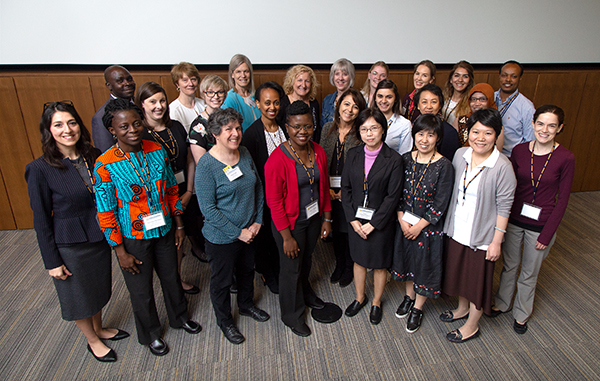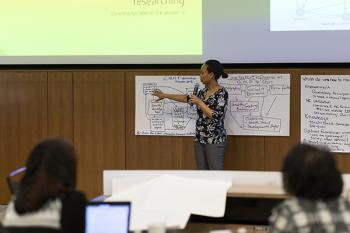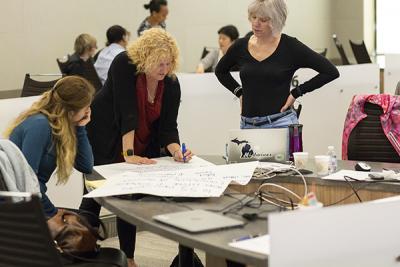Global Reproductive and Sexual Health Summer Institute
In May, 2018, University of Michigan School of Nursing (UMSN) organized its first Global Sexual Health Summer Institute. With faculty from UMSN and other health sciences at U-M, the Summer Institute is designed to help participants gain a broad insight into contemporary issues in reproductive and sexual health. The short, intensive course gives participants the skills and knowledge to advance their inquiry through state-of-the-science lectures, discussions, case studies, and small group work.

The event brought together 18 scholars, researchers, practitioners and faculty from a broad range of disciplines and backgrounds to UMSN. Participants traveled from cities throughout Michigan and Illinois, as well as across the world representing Chile, China, Ethiopia, Ghana, Indonesia, Thailand, Turkey, The Netherlands, Uganda and Zambia.
 This two-week Summer Institute featured sessions led by UMSN faculty, as well as U-M’s School of Public Health and Department of Medical Anthropology. Participants engaged with innovative research on global reproductive and sexual health through workshops tailored to the broad range of individual interests. Topics included developing research in a global setting, using big data, and contemporary issues in global and reproductive sexual health.
This two-week Summer Institute featured sessions led by UMSN faculty, as well as U-M’s School of Public Health and Department of Medical Anthropology. Participants engaged with innovative research on global reproductive and sexual health through workshops tailored to the broad range of individual interests. Topics included developing research in a global setting, using big data, and contemporary issues in global and reproductive sexual health.
Attendees also had the opportunity to visit U-M's Detroit Center, as well as the Coalition on Temporary Shelter (COTS) to learn about the challenges of family homelessness in the United States. All participants received a certificate of participation upon completion of the two-week course.
 Nursing Contact Hours were awarded to nurses attending the institute.
Nursing Contact Hours were awarded to nurses attending the institute.
Questions:
Contact Beste Windes at beste@med.umich.edu.
More photos
More photos are on UMSN's Facebook page. Please note that you do not have to have a Facebook account to view the photos.
Facilitators
 Jody Lori, Ph.D., CNM, FACNM, FAAN
Jody Lori, Ph.D., CNM, FACNM, FAAN
Associate Professor, University of Michigan School of Nursing
Dr. Lori’s program of research contributes to the design and testing of innovative models of care to improve maternal and newborn health in areas of the world challenged by a lack of human resources, long distances to care, and cultural, gender, and socio-economic barriers. Her research has contributed to the development of models of care to reduce the burden of maternal and newborn mortality on individuals, their families, and society through a program of participatory action research in low-resource countries. The key issue driving her research are the 300,000 maternal deaths, 2.6 million stillbirths, and 2.8 million neonatal deaths that occur each year worldwide, with the vast majority occurring in low resource countries. She has extensive field work experience in Ghana, Guatemala, Ethiopia, Liberia, Mexico, and Zambia.
Professor, University of Michigan School of Nursing
Trained as a demographer and epidemiologist, Dr. Stephenson’s work focuses on a range of sexual and reproductive health issues. His work is centered primarily on sexual and reproductive health, with a specific focus on the development and testing of HIV prevention interventions and the intersection between violence and health. Dr. Stephenson has a long history of work in women’s sexual and reproductive health, with a specific focus on maternal health issues in resource poor countries examining how climates of gender inequity put women at risk of poor maternal health outcomes. He is also director of The Center for Sexuality and Health Disparities.
Presenters
 Mike Brinich: Using Media to Communicate Research & Program Findings
Mike Brinich: Using Media to Communicate Research & Program Findings
Mike Brinich is the Director of Communications and Marketing at the University of Michigan School of Nursing.
He has more than 15 years of experience developing media outreach and marketing strategies for universities, private equity firms, and sports entertainment groups. Prior to joining the University of Michigan, he specialized in content strategies for Wayne State University in Detroit to raise public awareness about the school's health equity research and outreach. He holds an M.A. in public relations and advertising from Michigan State University, and a B.A. in advertising and mass communications.
 Ivo Dinov: Big Data and Demographic and Health Survey
Ivo Dinov: Big Data and Demographic and Health Survey
Ivo Dinov is Professor at the University of Michigan School of Nursing and Director of the Statistics Online Computational Resource.
He is an expert in mathematical modeling, statistical analysis, high-throughput computational processing and scientific visualization of large datasets. His applied research is focused on neurosciences, nursing informatics, multimodal biomedical image analysis, and distributed genomics computing. He is developing, validating and disseminating novel technology-enhanced pedagogical approaches for science education and active learning. Dr. Dinov's learning module is available here.
 Paul Fleming: Developing an M&E Plan; Evaluating program impact
Paul Fleming: Developing an M&E Plan; Evaluating program impact
Dr. Fleming is an Assistant Professor in the University of Michigan School of Public Health.
His mixed-methods research focuses on the social determinants of health and health behaviors, with a particular focus on developing and evaluating interventions in poor and marginalized communities in Michigan and abroad. He has previously worked as a community health Peace Corps volunteer in Nicaragua developing and implementing sexual and reproductive health programs for men and also as a consultant on issues related to the social determinants of health for the World Bank and the United States Agency for International Development. He received his Ph.D. in Health Behavior from the University of North Carolina and his MPH in Behavioral Sciences and Health Education from Emory University.
 Gary Harper: Participatory Approaches to Translating Research into Practice: Global Community Engagement
Gary Harper: Participatory Approaches to Translating Research into Practice: Global Community Engagement
Gary W. Harper, PhD, MPH is a Professor of Health Behavior and Health Education and Professor of Global Public Health at the University of Michigan School of Public Health, where he is also Director of the Office of Undergraduate Education.
Gary has been conducting LGBT and HIV-related research, practice, and training activities domestically for 30 years and in global settings since 2004, with former and current projects in Botswana, Ethiopia, Haiti, Israel, Kenya, Mozambique, and Zambia. He primarily works in collaboration with community agencies and community members to develop and evaluate a range of culturally and developmentally appropriate HIV prevention (primaryand secondary) programs and other health promotion efforts for children, adolescents, young adults, and families, with a primary focus on LGBT populations. Given the collaborative nature of Gary’s work, he prioritizes active global community engagement with an array of community takeholders, and focuses not only on health risks but also on individual and community-level resilience.
 Erin Kahle: Vulnerable Populations
Erin Kahle: Vulnerable Populations
Erin Kahle, PhD MPH, is an Assistant Professor at the University of Michigan School of Nursing.
She is an epidemiologist with over 15 years of research experience in public health and clinical research settings and is Core Faculty in the University of Michigan Center for Sexuality and Health Disparities. Her primary research focus includes understanding the impact of interpersonal and structural factors on immune function associated with infectious disease health outcomes in vulnerable and disadvantaged populations, specifically HIV and reproductive health. Dr. Kahle’s research interests include exploring he intersection between biologic and behavioral factors associated with infectiousness and transmission of disease and utilization of health care with the objective of developing novel approaches for health promotion and disease prevention in public health practice. Dr. Kahle is the Co-PI on a University of Michigan sponsored community partnership project to investigate the role of stigma and social network in decision to seek and utilize HIV testing and prevention, and has recently completed analyses to explore how HIV prevention is prioritized relative to other life issues. In addition, Dr. Kahle has two ongoing projects in Guatemala: one to assess life experiences and health care access among rural Guatemalan women and the other to pilot test peer-based HIV testing and counseling among female sex workers. Dr. Kahle also works with the International Center for Advanced Research and Training in Bukavu, Democratic Republic of Congo (DRC) to analyze patient data from women presenting to Panzi Hospital for treatment related to sexual violence.
 Yasamin Kusunoki: Reproductive Coercion
Yasamin Kusunoki: Reproductive Coercion
Dr. Kusunoki is an Assistant Professor at the University of Michigan School of Nursing.
Her research focuses on understanding sources of gender, racial/ethnic, and socioeconomic disparities in reproductive health behaviors and outcomes during adolescence and emerging adulthood, particularly the role of young people's social contexts such as their intimate relationships, families, neighborhoods, and schools. She is currently conducting research through a variety of grants to examine the risk of unintended pregnancy during emerging adulthood, the correlates and consequences of intimate partner violence, and trajectories of sexual violence victimization and perpetration among adolescents in middle and high schools. She is also collecting data on intimate partner violence and reproductive coercion experiences among women in health clinic settings in order to inform the development of an intimate partner violence and reproductive coercion intervention.
 Michelle Munro-Kramer: Intimate Partner Violence
Michelle Munro-Kramer: Intimate Partner Violence
Dr. Michelle Munro-Kramer is an Assistant Professor at the University of Michigan School of Nursing.
Her program of research focuses on gender based violence, particularly sexual violence, and reproductive health. She is interested in the primary prevention of violence as well as comprehensive care of vulnerable populations within domestic and international contexts. Her research projects approach these topics using a trauma-informed and patient-centered lens. She is currently working on a gender based violence prevention program on university campuses in Ghana. She is also in the process of adapting a web-based app to address healthy relationships and sexual violence on university campuses in the United States.
 Massy Mutumba: Global Perspectives on HIV & AIDS
Massy Mutumba: Global Perspectives on HIV & AIDS
Dr. Mutumba is an Assistant Professor at the University of Michigan School of Nursing.
She received her doctorate and master's of Public Health degrees from the University of Michigan and holds a Bachelors of Science in Nursing from Mbarara University of Science and Technology in Uganda. In addition to her clinical and research experience with pediatric HIV in Uganda, Kenya and the United States, Dr. Mutumba has been involved in several projects related to sexual and reproductive health in Sub-Saharan Africa, including studies on family planning and modern contraceptive use.
 Elizabeth Roberts: Cultural Humility in Research
Elizabeth Roberts: Cultural Humility in Research
Elizabeth F.S. Roberts is an Associate Professor of Anthropology at the University of Michigan.
She is an ethnographer of science, medicine, and technology. Her work has included research on assisted reproduction in the United States and Ecuador, reproductive governance in Latin America, transnational medical migrations, and, currently, environmental health science in the United States and Mexico. She is the author of God's Laboratory: Assisted Reproduction in the Andes (2012) and numerous articles about reproduction in Latin America. Currently, Roberts is the director of two ongoing team-based projects in Mexico City: “Mexican Exposures: A Bioethnographic Approach to Health and Inequality” and “Neighborhood Environments as Socio-Techno-bio Systems: Water Quality, Public Trust, and Health in Mexico City” (NESTSMX). In these projects Roberts and her team trace the looping life conditions that shape bodily relations, challenging the notion of biology as fixed, universal, and apolitical.
 Sarah Rominski: Fertility, Family Planning, and Abortion
Sarah Rominski: Fertility, Family Planning, and Abortion
Sarah Rominski is a Research Assistant Professor in the Department of Obstetrics and Gynecology at the University of Michigan.
Her work has focused on maternal health in sub-Saharan Africa, and she has worked on programs in Ghana, Liberia, and Ethiopia around clinical and research capacity building, defining and promoting respectful patient care during childbirth, human resources for health in rural areas, understanding contraceptive decision-making, and improving access to safe abortion care. More recently, Dr. Rominski has partnered with colleagues at the University of Cape Coast and the U-M School of Nursing to prevent sexual coercion and violence.
 Akshay Sharma: Managing Data Quality: Before, During and After Study Conduct
Akshay Sharma: Managing Data Quality: Before, During and After Study Conduct
Dr. Sharma is Assistant Professor at the University of Michigan School of Nursing.
He received his Ph.D. in epidemiology from Emory University, his MPH from Emory University’s Rollins School of Public Health, and a medical degree (MBBS) from Bangalore Medical College and Research Institute in Bangalore, India. Dr. Sharma’s research interests include examining new approaches for increasing the frequency of HIV testing among men who have sex with men in the United States, with a focus on rapid home HIV self-testing. He is also interested in evaluating behavioral and biomedical interventions for HIV prevention, and epidemiologic study design and methodological issues such as identifying analytical approaches to improve the detection of true underlying benefits of primary prevention strategies. Before moving to the United States, Dr. Sharma was involved in community HIV and STD risk reduction activities such as encouraging safe sex and promoting the use of barrier contraceptives in rural areas in the southern Indian state of Karnataka.
 Rob Stephenson: Research Design (Conceptual Framework)
Rob Stephenson: Research Design (Conceptual Framework)
Rob Stephenson, PhD, is Professor at the University of Michigan School of Nursing, where he also directs the Center for Sexuality and Health Disparities.
Trained as a demographer and epidemiologist, Rob’s work focuses broadly on sexual and reproductive health, with specific foci on HIV prevention for sexual and gender minorities and women’s sexual and reproductive health needs in resource poor countries.
 Sarah Stoddard: Developing Research Questions and Hypothesis
Sarah Stoddard: Developing Research Questions and Hypothesis
Dr. Stoddard is an Assistant Professor at the University of Michigan School of Nursing.
Her research aim is to prevent youth violence and substance use in vulnerable youth populations. As a prevention research, she studies the application of behavioral, family, and ecological approaches to preventing youth violence and substance use. In addition, she examines how social and environmental factors influence the future orientation, behavior, and health ofvulnerable youth. She has a decade of professional experience as a local public health nurse, a nurse practitioner in community- and school-based clinics, and as the State Adolescent Health Coordinator for the Minnesota Department of Health. She has an MS and a Ph.D. in nursing from the University of Minnesota with a focus on adolescent health. She completed a post-doctoral fellowship at the University of Michigan.
 Ruth Zielinski: Global Maternal Health Issues
Ruth Zielinski: Global Maternal Health Issues
Ruth Zielinski is Clinical Associate Professor and Midwifery Program Director at the University of Michigan School of Nursing.
She is a certified nurse midwife. Her Ph.D. is in nursing and women’s studied, received from the University of Michigan. Childhood experiences at a mission hospital in the United Arab Emirates shaped her decision to become a nurse-midwife and to include global women’s health in her career trajectory. Ruth has done work globally to reduce maternal and infant mortality and morbidity through midwifery and community education in South Sudan, Uganda, Liberia and Myanmar and includes students in these projects whenever possible.
Nursing Contact Hours information
* University of MI Health System Professional Development & Education is an approved provider of continuing nursing education by the Ohio Nurses Association, an accredited approver by the American Nurses Credentialing Center’s Commission on Accreditation. (OBN-001-91) (OH-423, 3/1/2019)
39.5 nursing contact hours were provided.
Sponsors
The Summer Institute is sponsored by a number of university partners, including the African Studies Center, the Center for the Education of Women+, the Center for Southeast Asian Studies, the International Institute, and the Center for Latin American and Caribbean Studies.


![]()
![]()






